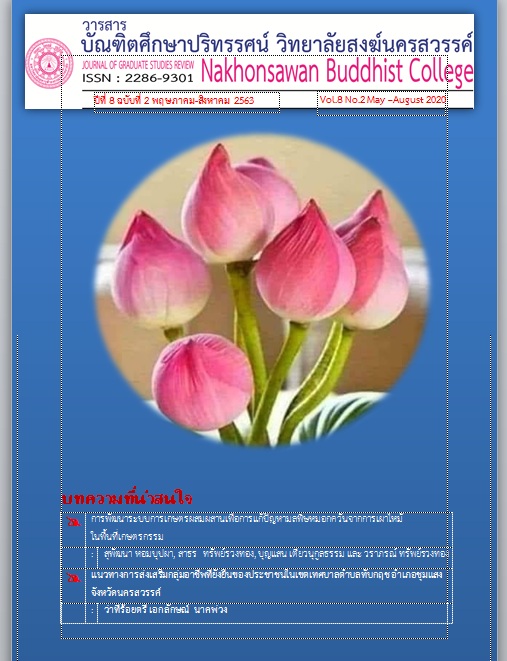ภาวะผู้นำตามหลักพุทธธรรมของผู้บริหารโรงเรียนมัธยมศึกษา ในจังหวัดนครสวรรค์
Main Article Content
บทคัดย่อ
บทความวิจัยนี้มีวัตถุประสงค์ 1) เพื่อศึกษาภาวะผู้นำตามหลักพุทธธรรมของผู้บริหารโรงเรียนมัธยมศึกษาจังหวัดนครสวรรค์ 2) เพื่อเปรียบเทียบความคิดเห็นของครูที่มีต่อภาวะผู้นำตามหลักพุทธธรรมของผู้บริหารโรงเรียนมัธยมศึกษาจังหวัดนครสวรรค์ โดยจำแนกตามอายุ ระดับการศึกษา ประสบการณ์การทำงาน และขนาดโรงเรียน 3) เพื่อศึกษาข้อเสนอแนะเกี่ยวกับภาวะผู้นำตามหลักพุทธธรรมของผู้บริหารโรงเรียนมัธยมศึกษาจังหวัดนครสวรรค์ การวิจัยนี้เป็นการวิจัยเชิงปริมาณและการวิจัยเชิงคุณภาพ โดยทำการศึกษากับกลุ่มตัวอย่างจำนวน 317 คน เครื่องมือที่ใช้ในการทำวิจัยเชิงปริมาณเป็นแบบสอบถาม มีค่าความเชื่อมั่นเท่ากับ .98 สถิติที่ใช้ ได้แก่ ค่าความถี่ ค่าร้อยละ ค่าเฉลี่ย ส่วนเบี่ยงเบนมาตรฐาน การเปรียบเทียบค่าเฉลี่ย (t-test) และการวิเคราะห์ความแปรปรวน (Analysis of Variance, ANOVA) ในการวิจัยเชิงคุณภาพทำโดยการสัมภาษณ์กับผู้ให้ข้อมูลสำคัญ จำนวน 12 คน จากนั้นนำข้อมูลที่ได้มาทำการสรุป วิเคราะห์ และสังเคราะห์ข้อมูล
ผลการวิจัยพบว่า
1) ความคิดเห็นของครูที่มีต่อภาวะผู้นำตามหลักพุทธธรรมของผู้บริหารโรงเรียนมัธยมศึกษาจังหวัดนครสวรรค์ สรุปรวมทุกด้าน พบว่า ภาวะผู้นำของตามหลักพุทธธรรมของผู้บริหารมีภาพรวมอยู่ในระดับมาก เมื่อพิจารณารายด้าน พบว่า ผู้บริหารมีภาวะผู้นำด้านปริสัญญุตา ด้านปุคคล ปโรปรัญญุตามากที่สุด และด้านอัตถัญญุตาน้อยที่สุด แสดงให้เห็นว่า ผู้บริหารโรงเรียนมัธยมศึกษาจังหวัดนครสวรรค์มีภาวะผู้นำในด้านปริสัญญุตา (ความเป็นผู้รู้จักชุมชน) มากที่สุด
2) เปรียบเทียบภาวะผู้นำตามหลักพุทธธรรมของผู้บริหารโรงเรียนมัธยมศึกษาจังหวัดนครสวรรค์ ตามความคิดเห็นของครูที่มีสถานภาพแตกต่างกัน พบว่า ครูที่มีอายุ ระดับการศึกษา ประสบการณ์การทำงาน และขนาดโรงเรียนแตกต่างกัน มีความคิดเห็นแตกต่างกันอย่างมีนัยสำคัญทางสถิติที่ระดับ 0.05 เป็นไปตามสมมติฐานที่ตั้งไว้
3) ข้อเสนอแนะเกี่ยวกับภาวะผู้นำตามหลักพุทธธรรมของผู้บริหารโรงเรียนมัธยมศึกษาจังหวัดนครสวรรค์ คือ 1. ผู้บริหารควรมีบุคลิกภาพที่น่านับถือ ไม่มีประวัติเสื่อมเสีย 2. ควรเข้าใจในความแตกต่างของครูแต่ละคน 3. ควรมีไหวพริบและสติในการแก้ไขปัญหา สามารถนำพาโรงเรียนไปสู่ความก้าวหน้า 4. ควรมีความพร้อมในทุกด้าน 5. ควรรอบรู้ในงานด้านต่าง ๆ เพื่อสามารถให้คำแนะนำแก่ครูได้ 6. ควรเป็นหลักหรือที่พึ่งพาได้เสมอเมื่อเกิดปัญหา 7. มีความเชื่อมั่นอยู่บนพื้นฐานของความถูกต้อง และมีความเชื่อมั่นในผู้อื่นด้วยเช่นกัน 8. ควรทำหน้าที่ในการบริหารงานของตนให้ดีที่สุด มีความรับผิดชอบทั้งต่อตนเอง ต่องาน และผู้ร่วมงาน และ 9. สามารถครองตน ครองคน และครองงานได้เป็นอย่างดี


